Rhododendrons For The 90s: The Northeast Perspective
American Rhododendron Society Annual Convention
Hyannis/Cape Cod, May 30 to June 3,1990
Jon M. Valigorsky, M.D.
Pittsfield, Massachusetts
The Massachusetts Chapter cordially invites you to attend the 1990 American Rhododendron Society Convention. The convention will be held in Hyannis, Massachusetts on Cape Cod. Nearby in Sandwich, between 1920 and 1940, Charles O. Dexter made significant breakthroughs in rhododendron hybridization. The convention highlights the accomplishments of Dexter and many other Northeast hybridizers from the Great Lakes to New Jersey to Nova Scotia. Hardy and adaptable plants, compact in size with attractive foliage and improved color, and plants that extend the blooming season have been and continue to be the goal of these hybridizers.
The convention offers a wide selection of tours, not only to local gardens and nurseries, but also includes a sightseeing tour of Cape Cod, a visit to a cranberry bog and a vineyard as well as tours to Weston Nurseries and Arnold Arboretum.
The conference theme, "Rhododendrons for the 90s - The Northeast Perspective", will be elaborated upon in numerous lectures and concurrent workshops. A truss show is open both to Massachusetts Chapter members and all convention registrants. Everyone is encouraged to bring trusses. A book sale will include the publication of the third volume (1951) of
Quarterly Bulletin
reprints. A plant sale with more than 7,000 plants will feature a broad selection of newer introductions from Northeast hybridizers in addition to a large selection of hybrids from the German hybridizer, Hans Hachmann.
The convention headquarters, the newly refurbished and expanded Tara Hyannis Hotel and Resort, is the same facility that was used for the 1980 convention. The entire hotel has been reserved for the convention at special room rates. Arrangements for overflow accommodations have been made at the Sheraton and Regency Hotels in Hyannis.
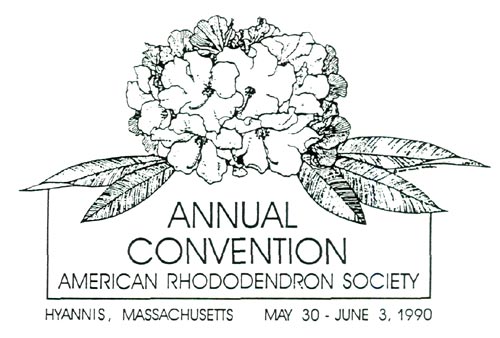
|
Speakers
Dick Murcott will open the convention program Wednesday evening with a talk entitled "These Magnificent Hardy Rhododendrons". Dick, a former director of both the New York Chapter and the national ARS has been breeding rhododendrons for a quarter of a century. This will be followed by "An Introduction to Heritage Plantation" by Gene Schott, Director of Heritage Plantation.
On Thursday evening, the after dinner speaker is Archie Skinner, head gardener for the National Trust at Sheffield Park Garden, Sussex, England. His subject is "The Ghent Azaleas; Their History and Conservation, and Their Place in the Landscapes of the 90s". Mr. Skinner is attempting to collect and preserve as many as possible of the heirloom Ghent azaleas.
On Friday, June 1, concurrent talks on four different themes will be given in the morning and then repeated in the afternoon. In addition to the program there is a broad selection of both half day and all day tours. The four themes are:
1). New Hybrids for Northeast Gardens
2). Breeding Goals
3). Rhododendrons in the Small Property
4). Companions for Rhododendrons.
As part of program one, New Hybrids for Northeast Gardens, Edward W. Collins, who has spent many years sleuthing out the many treasures of Heritage Plantation will speak on the Cowles Hybrids (program 101). Dr. Thomas L. Ring, past president of the Great Lakes Chapter and an active hybridizer and authority on rhododendron hybrids of that region, will speak on New Hybrids from the Great Lakes (program 102) and Dr. Richard Gustafson, past president of the Princeton Chapter, will talk on the Shapiro Hybrids (program 103).
In the second program on Breeding Goals, Dr. Joe Harvey, a biologist at Dalhousie University in Halifax, Nova Scotia, and current Atlantic region president of the Rhododendron Society of Canada, will speak on Breeding for Foliage (program 201). Hank Shannon, knowledgeable plantsman and a former ARS director, rhododendron nurseryman and active hybridizer, will speak on Breeding for Hardiness (program 202). Finally, Long Islanders Bob and Audrey Furman, longtime hybridizers in their Cape Cod garden in Barnstable will speak In Search of the Triple Five Elepidote hybrids (program 203).
The third program features Rhododendrons in the Small Property. Basic Landscape Principles (program 301) will be covered by Susan Plimpton, landscape architect in North Kingston, Rhode Island and longtime member of the Massachusetts Chapter, Indumented Species and Hybrids (program 302) will be discussed by C.J. Patterson who has ably served for the past four years as cochairman of the Plants for Members program of the Massachusetts Chapter. C.J. has lectured and conducted workshops for both the ARS and the Arnold Arboretum. She is the plant information officer at the Arboretum and is currently working on a federally funded project to review the rhododendron cultivar collection at the Arboretum. Small Lepidotes and Azaleas (program 303) will be discussed by Betty Cummins, proprietor of the Cummins Garden Nursery in Marlboro, New Jersey. This nursery specializes in smaller rhododendrons and azaleas as well as dwarf conifers and companion plants.
Finally program four, Companions for Rhododendrons, will be headed by the presentation, Small Ornamental Trees (program 401), by Dr. J.C. Raulston, director of the North Carolina State University Arboretum. Dr. Raulston conceived and developed the Arboretum as a plant evaluation center and has collected over 7,000 species and cultivars for evaluation. He is dedicated to expanding the palate of plants used in American gardens. A second presentation on Perennials (program 402) is by Leo Blanchette, former Massachusetts Chapter president, a biologist and educator and proprietor of Blanchette gardens in Carlisle, Massachusetts, which specializes in rare and unusual perennials. Dwarf Ericaceae for the Rock Garden (program 403) will be discussed by Steve Doonan and Phil Pearson. Steve and Phil are cousins and co-owners of Grand Ridge Nursery in Issaquah, Washington, specializing in choice alpine plants. They are well known for the scientific methods which they apply in growing difficult alpines and have botanized extensively in the western mountains and in the orient.
Wayne Mezitt, president of Weston Nurseries, will speak Friday evening, June 1, on "Weston Hybrids: An Overview." He will discuss the many new and exciting lepidote and elepidote rhododendron hybrids in the pipeline and under evaluation from Weston Nurseries.
On Saturday, June 2, the day will be devoted to tours with an address in the evening by Dr. David G. Leach. Dr. Leach is recognized as the world's leading authority on the genus
Rhododendron
. He is author of
Rhododendrons of the World
, still the bible for many rhododendron growers, and is actively at work on a new edition. His continued and varied contributions to rhododendrons span almost 50 years. He began hybridizing in the late 1940s and has carried hybrids to the fifth and sixth generation. He was one of the original members of the 1950s Dexter study group that formed the basis for the restoration of Dexter rhododendrons to American gardens. He received a gold medal, the highest award the ARS can bestow, in 1965. He has travelled extensively in search of new plants, but is perhaps most widely known for his hybridizing work in developing superior and outstanding plants for severe climates.
The meeting concludes Sunday morning, June 3, with four concurrent sessions on a number of practical aspects of rhododendron culture. In addition, there is a session devoted to papers presented by research scientists, many of whom have been working under grants from the ARS Research Foundation (program 501).
Problem Diagnosis of Rhododendron Diseases (program 601) will be presented by Dr. Larry Englander, associate professor of plant pathology at the University of Rhode Island. Larry has conducted research in mycorrhizal associations of rhododendrons and stem rot of cuttings. In program 602, Pest and Disease Control will be discussed by Gary Couch, horticultural entomologist at the suburban experimental station, University of Massachusetts. Gary is an authority on insect plant relationship and also on integrated pest management.
Program 701 on Rhododendron Nutrition will be given by Susan Gordon, a doctoral candidate at the University of Rhode Island. Her studies have included the effects of nitrogen on rhododendron rooting and flower bud acclimation of evergreen azaleas. Program 702 is by Peg Megowen, horticulturist of South Dartmouth, Massachusetts. Peg will discuss Pruning Rhododendrons and Azaleas.
Information on using a Lofthouse Propagation Frame, program 801, will be delivered by Jonathan Leonard, owner of Briarwood Gardens in Sandwich, Massachusetts, a nursery which is also on the garden tours. Jonathan is an expert propagator and authority on the Dexter rhododendrons. He has served on the board of the Massachusetts Chapter and is now active in the Cape Cod and Islands Chapter. Program 802 on Propagation Ethics and Breeders Rights will be presented by Richard Jaynes. Dick is well known as the leading authority on the genus
Kalmia
and author of
Kalmia: The Laurel Book II
. He now operates Broken Arrow Nursery in Hampden, Connecticut.
Program 901, Computers in the Garden, will be presented by Dr. Donald Kellum, an orthopedic surgeon from Charlotte, North Carolina. Dr. Kellum is past president of the Piedmont Chapter and a past district director of the ARS. In addition to hybridizing rhododendrons, he has travelled in Nepal and Sikkim and is a pioneer in computer applications for home gardens. An additional application of computers will be discussed in program 902, the Rhododendron Registry by Jay Murray, ARS registrar, and Robert Murray, former ARS director and developer of the registry data base program.
Tours
A wide selection of garden tours are planned for the meeting in Hyannis. In addition to the scheduled garden tours described below, a number of gardens including the Pilkington garden of Consolini hybrids will be opened before and after the convention for those wishing to visit on their own. Garden descriptions and directions can be requested on the registration form. The convention garden tours are more completely detailed on the convention insert and will only be summarized here.
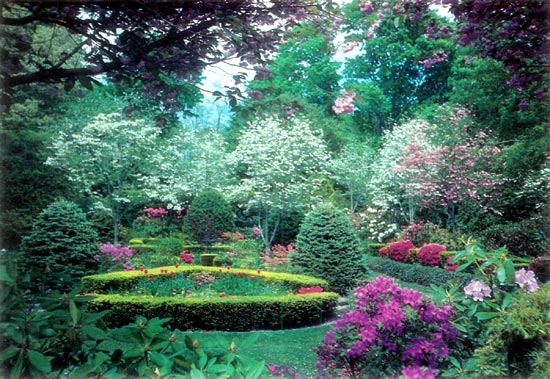
|
|
Pilkington Garden Of Eve
Photo by Pilkington |
On Thursday, May 31, tours visit Heritage Plantation. Tour A, limited to 400 participants, will depart the Tara at 10:30 a.m., arrive at Heritage at 11:15 a.m. and will include a boxed lunch. Heritage Plantation has graciously invited ARS members to a complimentary wine and cheese gala reception on the grounds beginning at 5 p.m. At 5:50 p.m., Tour A will board buses returning to Hyannis. Tour B will depart in the afternoon for Heritage, leaving at 1:45 p.m., arrive at 2:30 p.m., and attend the wine and cheese reception at 6 p.m. returning one hour later to Hyannis. Heritage harbors not one but three collections of rhododendrons. The first, spread throughout the grounds, consists of rhododendrons planted by Charles O. Dexter that are now between 46 and 68 years old. The second, located in a dell between two of the museums, is comprised of named Dexter hybrids brought back to the estate by horticulturists Jack Cowles and Heman Howard 15 to 25 years ago. Finally, there is a third collection of hybrids created not by Charles Dexter but by Jack Cowles from 1959 to 1967. These plants, now 22 to 30 years, constitute the population of highly visible younger rhododendrons found throughout the plantation outside the display garden.
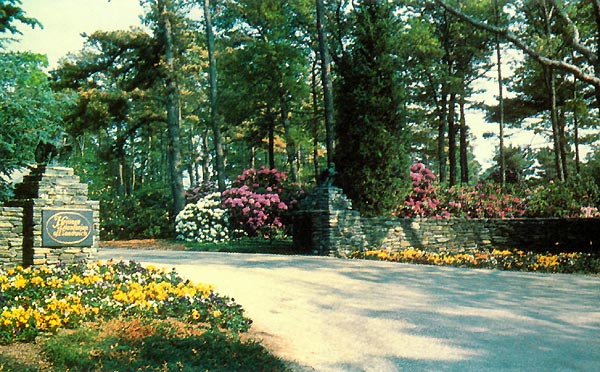
|
|
Main gate at Heritage Plantation.
Photo courtesy of Heritage Plantation |
Friday, June 1, features a great selection of activities including a choice of the following: Tour C, a half day trip to the Duplinsky garden in Sandwich and the Briarwood Gardens nursery, in East Sandwich. This tour repeats in the afternoon as Tour G. Each tour is limited to 184 participants. Salishan East, as the Duplinsky garden is known, is a casual garden with various plants collected over a number of trips throughout the United States, England and Scotland. The emphasis has been on unusual foliage with the blooming period providing a bonus in the spring. Species rhododendron are joined by hybrids grown from ARS seed over the past 20 years. Plants of borderline hardiness, such as camellias, also are represented.
Briarwood Gardens offers a reference collection of Dexters, additional Dexters not found at Heritage, a collection of Jack Cowles hybrids of blooming size and other unusual and rare rhododendrons and shrubs. In addition, there are several small groups of the nursery's own hybrids. Tour D is an all day tour to the Harwich port garden of John Elliot, the Chatham garden of Martha Drake and the Old Colony Cranberry Bog in Yarmouth. It is limited to 92 participants and includes a boxed lunch.
The garden at San Mai An, or "Freedom from Worldly Thoughts" was eloquently described by John Elliot in the
ARS Journal
, Vol. 43:4, fall, 1989. It provides an example of one gardener's ability to adapt to limited space and existing natural environment and is characterized by fluid movement, which means not only formal movement throughout the entire garden but also individualized, self contained shapes; variety that surprises and invites one to continue on; quiet colors emanating from the muted winter foliage of conifers and heathers, the subdued color spectrum of summer blooming callunas, and the red woody outlines of dormant acers all contributing to an atmosphere of serenity.
The Drake garden is on Morris Island one quarter mile south of Chatham. The island is connected to the mainland by a causeway bounded on the west by Stage Harbor and to the east by the Atlantic Ocean. Although winter temperatures are seldom below 0°F, temperature changes are precipitous and the garden is often buffeted by winds in excess of 60 miles per hour. These conditions have dictated careful garden placement of a broad selection of rhododendrons, alpines and companion plants.
A visit to the Old Colony Cranberry Bog in Yarmouth will highlight the important role this industry plays in safeguarding the ecology of southeastern Massachusetts.
Tour E is a second all day tour to visit the Huie garden in Westport Point, Massachusetts, the Atwater garden in Little Compton, Rhode Island and the Sakonnet Vineyards in Rhode Island. This tour is limited to 46 participants and includes a boxed lunch. Landscaped by Allan Haskell, the Huie garden features a collection of 500 rhododendron hybrids and 150 species. Of particular interest are about 75 dwarf rhododendrons, mostly species, which are growing in a lath house protected by plastic sheeting during late December, January and February.
The Atwater garden near the ocean in Little Compton, Rhode Island, combines rock gardens featuring dwarf rhododendrons with mixed shrub borders containing both tall and dwarf elepidotes. Sakonnet Vineyards were established in 1975 on the premise that the microclimate along the southeastern New England coast closely resembles that of many of the world's great wine regions. Guests will have a guided tour of the vineyards and the building where wine is produced and stored. Various varietal wines produced at Sakonnet will be discussed, additional literature will be available and several wines will be sampled.
Tour F is an all day guided sightseeing tour of Cape Cod limited to 92 participants. In addition to the tours, a selection of concurrent talks on four different themes as discussed above will run in the morning and be repeated in the afternoon.

|
|
Lily Pond, Garden In The Woods, Framingham.
Photo by Dorothy Long |
Saturday, June 2, will be devoted to a choice of one of three full day tours. The first, Tour H, an all day tour to The Garden in the Woods, the showcase of the New England Wildflower Society in Framingham, the Massachusetts Chapter's rhododendron display garden at Case Estates in Weston and the Arnold Arboretum in Jamaica Plain. This tour, limited to 92 participants, includes a boxed lunch. The Garden in the Woods is one of the loveliest naturalistic gardens in the Northeast. Beginning in the early spring and continuing through late fall, this sanctuary displays an ever changing kaleidoscope of colorful wildflowers, shrubs and trees. Throughout June, flowering shrubs dominate the landscape - flame azaleas, mountain laurels and rhododendrons (including
R. arborescens
,
R. calendulaceum
,
R. catawbiense
,
R. x gandavense
'Narcissiflora',
R. indicum
'Balsaminiflorum',
R. ponticum
and
R. yedoense
var.
poukhanense
). At this time the greatest number of wildflowers such as yellow star grass, penstemon species, meadow beauty, pitcher plant and flowering raspberry are blooming in the garden's sunnier areas. Around the Lily Pond, wild and cultivated iris mingle their reflections with nearby rhododendrons.
The Case Estates is the Massachusetts Chapter's rhododendron display garden. The overall design, as conceived and developed by our landscape architect and fellow chapter member, John Gwynne, envisioned a series of distinct, yet connected, theme gardens. Garden number one, the entrance garden (now completed), is an introductory garden - a "curtain raiser". It consists of four beds with a long blooming season and particular emphasis on color combinations and variations in size and textures. All gardens include companion plants, flowering trees and ground covers.
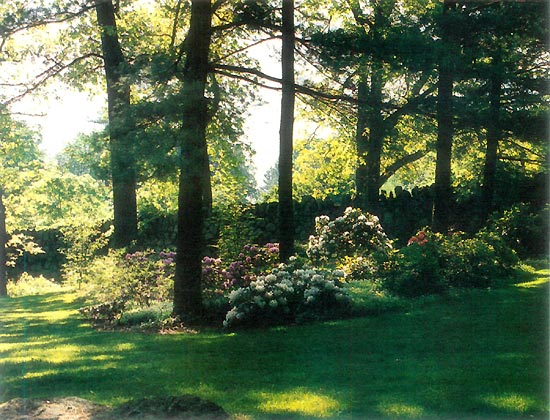
|
|
Massachusetts Chapter Display Garden at Case Estates.
Photo by Bruno Falanga |
Harvard University's Arnold Arboretum in Jamaica Plain contains forest and woodland plants of the northern half of the world. More than 7,000 kinds of trees, shrubs and vines from around the world grow throughout the Arboretum's 265 acres.
Established in 1872 and named for its benefactor, James Arnold, it is the oldest arboretum in America designed for both university and public use. Frederick Law Olmsted, the father of American landscape architecture, and Charles Sprague Sargent, the first director of the Arboretum, arranged the plantings in harmony with the natural features of the site to resemble a New England woodland. As far as possible, the trees are grouped according to genus along the main drive.
Tour I, all day, is comprised of four private gardens in Duxbury and one in Hanson. It is limited to 184 participants and includes a boxed lunch. The Eaton garden in the lovely town of Duxbury is a natural garden overlooking several ponds with rolling open areas surrounded by a verdant woodland resembling a frame around a painting. The garden includes some west coast hybrids, but features the stalwart hybrids of David Leach and Edmund Mezitt.
Inwood, the garden of Maria Farro is in Duxbury village. An authentic "Colonial" home, built circa 1720, lies nestled within 6 acres of secluded woodland and is surrounded by several acres of undeveloped dense woods. The entrance of the property is marked by two granite hitching posts. A private driveway winds through a forest of white pines dappled with flowering dogwoods and bordered by natural beach plum and a spectacular mass planting of rhododendrons and mountain laurel. At the time of purchase in 1979 the present owner set about extending the line of azaleas and rhododendrons the full length of the pond. Especially satisfying was clearing several overgrown areas, extending a natural trail and cutting a path through the woods around the pond. Here one can stroll past the colorful azaleas and mature rhododendrons, some of which have now attained heights of 12 feet and enjoy the breathtaking fragrance. New varieties of plantings have been added throughout the grounds. Especially cherished is a planting of the rhododendron hybrid 'Evening Glow'.
Windy Hill, the woodland garden of Tim Craig, one of the founding members and long term secretary of the Massachusetts Chapter was begun in 1938. Open pollinated seedlings of 'Scintillation' form one backbone of this garden and are lovely examples of its value as a seed parent. Seedling rhododendrons were obtained at the Dexter estate in 1939 by digging them up with a picnic spoon. These "spoonlings" survive as magnificent mature plants. Rhododendron hybrids of many ages and sizes fill out the garden from the "Plants for Members" program and from friendship with Weldon Delp.
Blue Fish River Farm is the home of Peg and Ben Lawson, lifelong gardeners. For the past 12 years, Peg has been keenly interested in hybridizing for yellow rhododendrons, both elepidote and lepidote. In addition, many crosses have been grown from the ARS seed exchange. The result is an intriguing garden of new hybrids under evaluation. A recently registered hybrid is the lovely 'Duxbury'. The garden is in lettered sections accompanied by a comprehensive directory.
Rhodyrest, the Hanson home of Henry and Barbara Wrightington, consists of several acres of land originally covered with such thick growth that nothing survived the dense shade. Gradually, they began developing a woodland garden with rhododendrons as a focal point. Many native and other companion plants such as wildflowers, hosta, some daylilies and other smaller ornamental trees and shrubs were added along the paths cut out amidst the existing oaks, pines and birches.
As plant collectors, they have assembled numerous named and unnamed Dexter hybrids, many of the Swarthmore hybrids of John Wister, plants of Orlando Pride and David Leach as well as other hybrids hardy in their area. Their most recent challenge is to collect Weldon Delp hybrids and evaluate their performance in southeastern Massachusetts. This is a young garden compared to the Duxbury gardens, but one in which the rhododendrons are superbly grown.
Tour J, all day, includes Weston Nurseries in Hopkinton and a private garden in Newton. It is limited to 460 participants and includes a boxed lunch. Weston Nurseries is a "must" visit for the rhododendron enthusiast and anyone interested in horticulture. It is here that the late Ed Mezitt developed and introduced many of the rhododendrons that have become industry standards. The rugged Hopkinton climate and terrain provide an ideal testing site for new hybrids that are bred to withstand the rigors of the Northeast. Ed's primary goals are perpetuated in the current breeding, testing and introduction programs: to create plants with improved flower colors that are truly winter hardy, look attractive all year and require minimum maintenance in the garden.
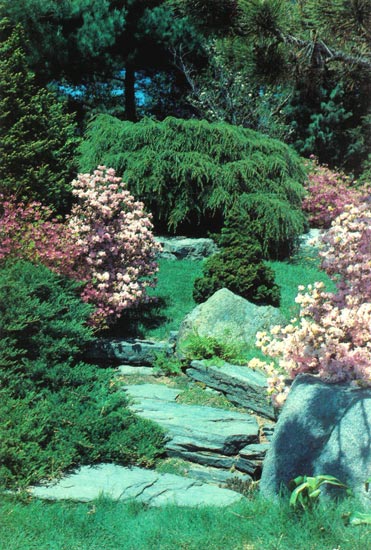
|
|
A naturally landscaped garden
at Weston Nurseries. Photo by R. Wayne Mezitt. |
The Haffenreffer garden in Newton was begun about 25 years ago. Marion, a keen gardener since childhood, is especially fond of spring bulbs. Her other horticultural interests include rhododendrons and azaleas, wildflowers, primroses and lilies. From a terrace beside the house the broad lawn slopes gently down to a willowed edge pond. Flowering trees and beds of azaleas and rhododendrons along the sides of the lawn complete the picture of an English landscape type garden.
Join Us In Hyannis!
On October 10, 1970 a group of 40 or so individuals met at Heritage Plantation to inaugurate the Massachusetts Chapter of the ARS. The speaker that day was Dr. David G. Leach. Before the talk a matron was overheard to say "all I wanted to do was to learn something about rhododendrons for my garden, not to hear some horse doctor talk." Apparently there was a local veterinarian by that name. Please join us and the real Dr. David Leach in Hyannis to celebrate our 20th year!
Jon Valigorsky has contributed many articles on hardy rhododendrons to the ARS Journal. His most recent was "Hardy Dexter Rhododendrons," Vol. 43:4.